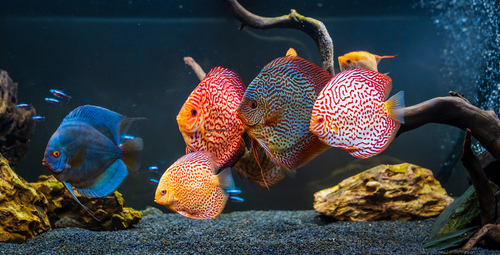Do you wish to give your discus aquarium more diversity? Given the care and commitment required for discus to live healthily, I think a discus tank should only house discus.
You will discover as many points of view as there are people who keep discus, though, in your search for the ideal tank companions. At the end of the day, though, if you pick the right tank mate companions – like the ones that we highlight below – you won’t have anything to worry about.
15 best Discus tank mates:
- Siamese Algae Eater
- Dwarf Gouramis
- Harlequin Rasbora
- Rummy Nose Tetra
- Cardinal Tetra
- Neon Tetra
- Pencil Fish
- Pleco Fish
- Corydoras Catfish
- German Blue Ram Cichlids
- Freshwater Angelfish
- Rainbow Fish
- Clown Loaches
- White Cloud Mountain Minnow
- Bloodfin Tetras
Here are all the details you need to know about caring for a discus and their compatibility with each of the species listed above.
Contents
Discus Tank Mates – What You Need to Know
Temperament
Discus fish are innately cautious, reserved, and bashful. As a result, students benefit from a quiet educational environment. Avoid picking tank mates for a discus fish that might end up becoming “bullies” for them at all costs. discus only ever act aggressively toward other members of their species.
Size
Small schooling species in a lovely display tank, like characins, are preferred by discus fish. When your fish detect characins in a discus aquarium, they will automatically leave the their hiding spaces since they believe swimming with characins in the open is secure.
Competition
It’s critical to think about tank mates that wouldn’t trample on the discus fish or outcompete them for food.
Discus fish also eat slowly. Therefore, avoid fish that become too excited or aggressive during feeding time as discus fish tank mates.
Parameters & Tank Setup
Discus fish demand the best tank conditions and care because they are not like your typical tropical freshwater fish. Thus, discus fish are not recommended for beginning aquarists. For other tropical fish, 85 to 86 degrees is a lot of heat, but discus fish like it. Therefore, only put discus in tanks with other fish that can withstand higher temperatures.
15 Best Discus Tank Mates
More popular posts in a similar category you might like:
1. Siamese Algae Eater
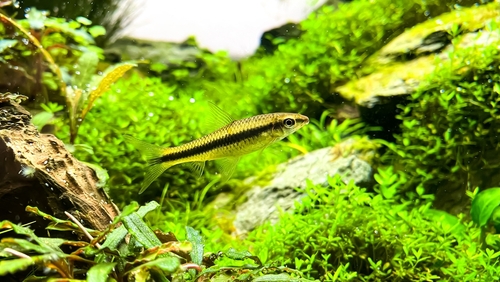
- Scientific Name: Crossocheilus oblongus
- Mature Size: 6 inches
- Compatible with: peaceful fish
- Water Temperature: from 72 to 82°F
- Minimum tank size: 20 gallons
- Care Level: Beginner
A medium-sized member of the carp family, the Siamese algae eater grows to a maximum length of around 6 inches when kept in captivity. The transparent body of the Siamese algae eater features a single stripe in front of its eyes and is fashioned like a tiny torpedo.
Since they are calm fish species and are typically unaware of the actions of higher-level fish in the community tank, they make suitable tank mates for discus fish. The Siamese algae eaters are not violent and territorial, like many other bottom dwellers.
The Siamese algae eater’s tank size requirement—roughly 20 gallons—makes them the ideal tank companions for discus.
Pros to Siamese Algae Eater:
- Docile
- Not territorial
Cons to Siamese Algae Eater:
- A bit large
2. Dwarf Gouramis
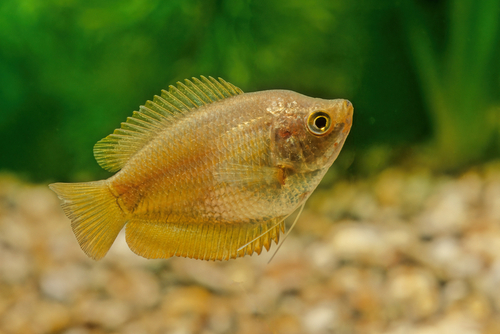
- Scientific Name: Colisa Lalia
- Mature Size: 4 to 4.5 inches
- Compatible with: peaceful fish
- Water Temperature: from 72 to 82°F
- Minimum tank size: 10 gallons
- Care Level: Moderate
Labyrinth fish, dwarf gouramis, are calm and docile and enjoy higher temperatures and a bigger tank of around 10 gallons. Dwarf gouramis make suitable discus tank mates. However, they require access to surface air to breathe and are, therefore, excellent for novices.
Similar to discus fish, dwarf species are susceptible to illness. Therefore, they need adequate filtration and a balanced diet to stay content, healthy, and prosperous.
Pros to Dwarf Gouramis:
- Docile
- Calm
Cons to Dwarf Gouramis:
- Susceptible to illnesses
- Require extra filtration
3. Harlequin Rasbora
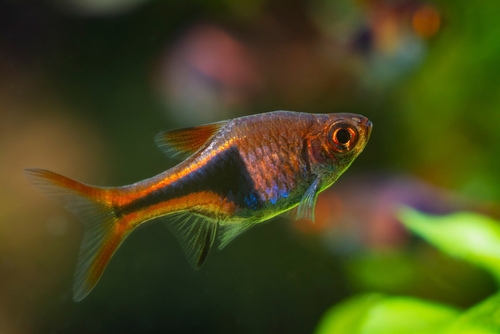
- Scientific Name: Trigonostigma heteromorpha
- Mature Size: 1.75 inches
- Compatible with: very compatible in a community tank
- Water Temperature: from 73 to 82°F
- Minimum tank size: 10 gallons
- Care Level: Intermediate
The lovely and calm harlequin rasbora, or red rasbora, make perfect tank mates for the discus fish since they require soft, acidic water with little to no total salt.
They grow to about 5 inches and have a lifespan of approximately six years. They like water that is between 73 and 82 degrees. Due to its tendency to school and suitability for a community tank of small fish species, the harlequin rasbora makes excellent tank mates for the discus fish.
Pros to Harlequin Rasbora:
- Calm
- Require acidic water
Cons to Harlequin Rasbora:
- Require multiple per tank for schooling
4. Rummy Nose Tetra
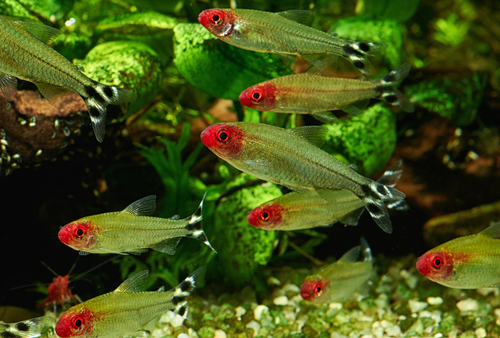
- Scientific Name: Hemigrammus rhodostomus
- Mature Size: 2 to 2.5 inches
- Compatible with: peaceful fish
- Water Temperature: from 75 to 85°F
- Minimum tank size: 20 gallons
- Care Level: Intermediate
You will be amazed by the mild and well-liked rummy nose tetra’s unique look.
Small fish and 2 to 2.5 inches long rummy nose tetras are perfect for a discus tank. They like to spend time alone because of rummy nose tetra’s tranquil disposition. Additionally, they are schooling fish that live in collections of six or more in the center of a fish tank.
Pros to Rummy Nose Tetra:
- Docile
- Solitary
Cons to Rummy Nose Tetra:
- Require 6 per tank for schooling
5. Cardinal Tetra
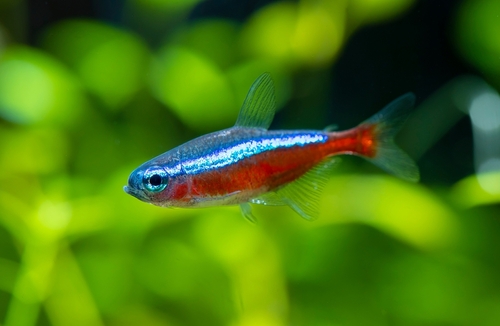
- Scientific Name: Paracheirodon axelrodi
- Mature Size: 2 inches
- Compatible with: very compatible in a community tank
- Water Temperature: from 73 to 81°F
- Minimum tank size: 20 gallons
- Care Level: Moderate
The hardiness of cardinal tetras, which is simple to maintain for novices, is one of the key factors behind their appeal. Cardinal tetra are tough freshwater fish, yet they are challenging to reproduce in captivity.
They only reach a maximum length of 2 inches and have a limited lifespan of around a year. Therefore, they make good tank mates for discus fish.
They are calm animals that may be kept carelessly in public aquariums because of their disposition. You can easily maintain discus fish with them because they often occupy the middle of the water. Cardinal tetras may also be kept with discus since they need warm water.
Pros to Cardinal Tetra:
- Durable
- Calm
Cons to Cardinal Tetra:
- Shorter lifespan
6. Neon Tetra
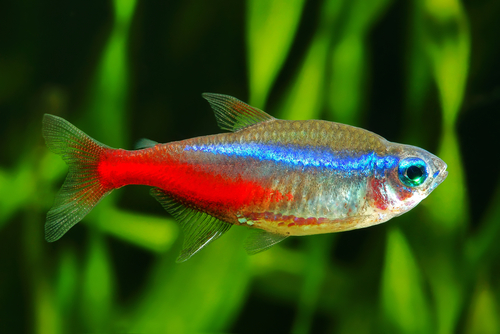
- Scientific Name: Paracheirodon innesi
- Mature Size: around 1.5 inches
- Compatible with: most community fish
- Water Temperature: from 72 to 76°F
- Minimum tank size: 10 gallons
- Care Level: Beginner
One of the most well-liked aquarium fish, neon tetras may grow to a maximum length of almost 1.5 inches.
Neon tetras are mostly natives of the Amazon River. As a result, it loves water that is quite soft and acidic, with a pH range of 5.5 to 7.4, which is moderately warm (about 76 degrees).
Neon tetras make excellent tank mates for discus since they enjoy living in groups of at least ten or more. Since they are not solitary fish, keeping them alone will cause them to suffer from stress and loneliness. Since neon tetras are a tranquil species, they get along well with other peaceful fish like discus fish.
Pros to Neon Tetra:
- Smaller size
Cons to Neon Tetra:
- Can get stressed if lonely
7. Pencil Fish
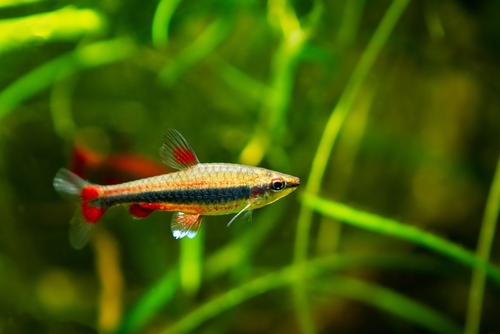
- Scientific Name: Lebiasinidae
- Mature Size: around 1.5 to 2 inches
- Compatible with: most community fish
- Water Temperature: from 72 to 78°F
- Minimum tank size: 10 gallons
- Care Level: Intermidiate
Pencil fish like to hang out with other small and dwarf species and are cautious. They make a fantastic discus tank companion since they are sluggish swimmers and will give your discus fish plenty of eating time.
Feel free to fill your discus tank with natural plants and several hiding spots because they prefer large spaces with a well-planted habitat.
Like discus, pencil fish will eat everything, but the food must be appropriate because of their tiny mouths.
Pros to Pencil Fish:
- Sluggish swimmers
Cons to Pencil Fish:
- Require small food
8. Pleco fish
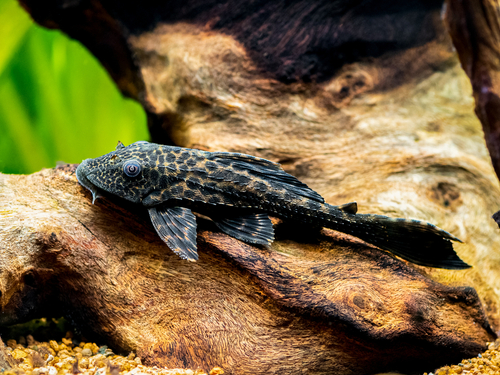
- Scientific Name: Hypostomus plecostomus
- Mature Size: around 1.5 to 12+ inches
- Compatible with: most fish species
- Water Temperature: from 72 to 82°F
- Minimum tank size: 20 gallons
- Care Level: Intermediate
Plecos, the freshwater fish with sucker-shaped mouths and bony plates all over their body, are bottom-feeding, algae-eating fish.
Because they are scavengers and consume practically everything in their path, plecos are sometimes referred to as “janitor fish,” which is perfect for novices. They favor warmer climates and are very protective of their territory around other Plecos. Therefore, keeping just one pleco in a tank with discus fish is advised.
Pros to Pleco Fish:
- Clean algae from tanks
Cons to Pleco Fish:
- Territorial
- Only keep one per tank
9. Corydoras Catfish
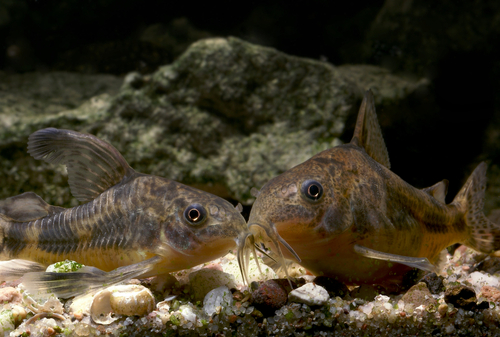
- Scientific Name: Corydoras paleatus
- Mature Size: 3 inches
- Compatible with: peaceful fish
- Water Temperature: around 78°F
- Minimum tank size: 10 gallons
- Care Level: Beginner
Corydoras seldom annoy other aquarium fish since they are so quiet. Bottom-dwelling corydoras spend most of their time looking for food there. They typically do not grow longer than 3 inches and like spending time with other corys and fish, mainly the discus fish, one of the main reasons they make suitable tank mates for discus.
The corydora’s water requirements are similar to those of discus fish and favor hotter climates.
Pros to Corydoras Catfish:
- Quiet
- Sociable
Cons to Corydoras Catfish:
- Prefer cooler water
10. German Blue Ram Cichlids
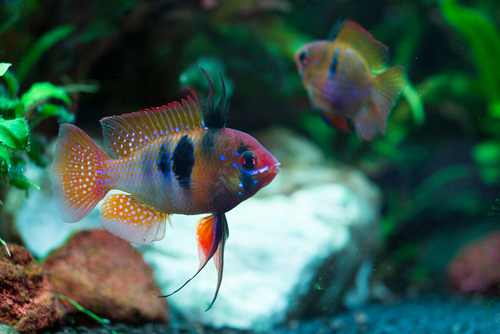
- Scientific Name: Mikrogeophagus Ramirezi
- Mature Size: 2 to 3 inches
- Compatible with: peaceful fish but with caution
- Water Temperature: from 78 to 85°F
- Minimum tank size: 20 gallons
- Care Level: Intermidiate
German blue rams, in contrast to other cichlids, are calm fish. They are tiny freshwater aquarium fish that only grow to a maximum length of 2-3 inches, making the ideal tankmates for your discus fish.
German blue rams, however, prefer to establish their territories, so I propose maintaining Discus fish and keeping them with caution. You will also want to give lots of shelter near the bottom of the tank in the shape of caves, pots, and other rocks.
Pros to German Blue Ram Cichlids:
- Calm
- Small size
Cons to German Blue Ram Cichlids:
- Territorial
11. Freshwater Angelfish
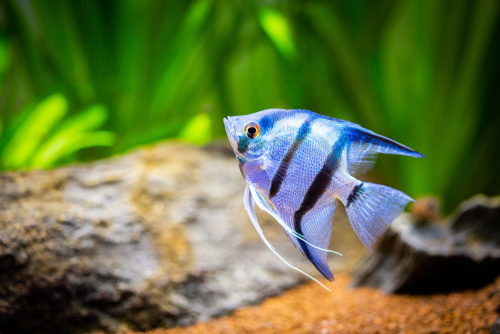
- Scientific Name: Pterophyllum
- Mature Size: 3 to 4 inches
- Compatible with: some fish, but they are semi-aggressive
- Water Temperature: from 75 to 82°F
- Minimum tank size: 20 gallons
- Care Level: Moderate
The most excellent discus tank mates are freshwater angelfish since they are similar in temperament, movement, and eating preferences.
Angelfish may become violent and territorial while feeding and mating; therefore, you must take specific safety measures to maintain them along with discus fish. Therefore, if your discus fish are specifically housed with freshwater angelfish, you must ensure they are well-fed.
If you want to keep them together in the same tank, choose a bigger tank to manage their temperament. You should also change the decor of your tank, so they don’t become territorial.
Finally, ensure your discus fish have plenty of hiding places by adding plenty of rocks, plants, and other areas.
Pros to Freshwater Angelfish:
- Similar diet
- Similar temperament
Cons to Freshwater Angelfish:
- Aggressive when eating ; mating
- Territorial
12. Rainbow Fish
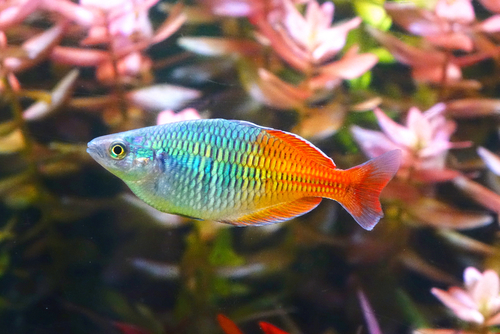
- Scientific Name: Marosatherina ladiges
- Mature Size: 2 to 6+ inches
- Compatible with: peaceful fish
- Water Temperature: from 72 to 82°F
- Minimum tank size: 30 gallons
- Care Level: Intermidiate
Given the temperament and necessary water conditions of Discus fish, gorgeous rainbow fish that are calm and docile complement them.
They are little fish that range in length from 2 to 6 inches and enjoy a lot of open room for comfortable swimming. They require huge tanks with several plants and other hiding spots, just like a discus.
Discus and rainbow fish can coexist since they both need the same amount of water. Rainbow fish prefer to dwell in huge groups and prefer higher water temperatures between 76 and 82°F. To maintain their health and happiness, it is advised to have a school of 5 or more rainbow fish in the aquarium.
Pros to Rainbow Fish:
- Docile
Cons to Rainbow Fish:
- Requires multiple for schooling
13. Clown Loaches
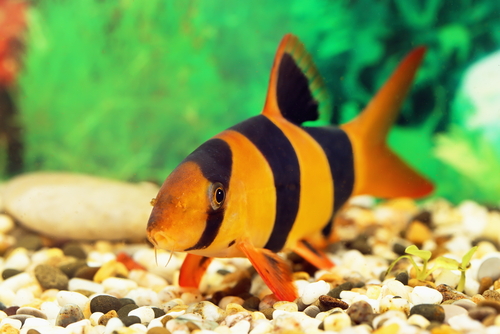
- Scientific Name: Chromobotia macracanthus
- Mature Size: 12 inches
- Compatible with: peaceful fish
- Water Temperature: from 75 to 85°F
- Minimum tank size: 100 gallons
- Care Level: Moderate
Clown loaches are a highly robust fish species suitable for aquarists of all skill levels since they require little maintenance.
They are calm freshwater fish with a colorful look that accurately reflects their name. The same warm water temps that discus prefer are also ideal for clown loaches. They grow large and prefer to be around a group of their own kind, so you will need plenty of space.
Pros to Clown Loaches:
- Robust
- Calm, gentle
Cons to Clown Loaches:
- Large size
14. White Cloud Mountain Minnow
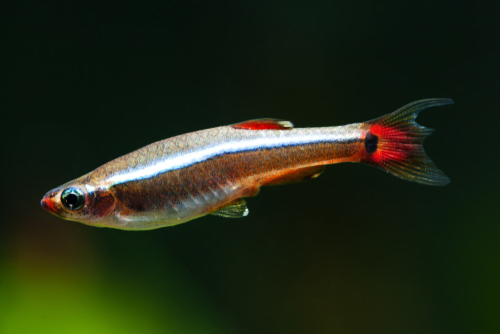
- Scientific Name: Tanichthys albonubes
- Mature Size: around 1.5 inches
- Compatible with: peaceful fish
- Water Temperature: 60 to 72°F
- Minimum tank size: 10 gallons
- Care Level: Beginner
Mountain White Cloud Minnows are a well-liked aquarium fish that is vibrant, calm, and gentle, making it the ideal community fish for discus.
However, they prefer cooler climates, which may make maintaining them alongside discus fish challenging. Neon tetras and other tropical fish species can live, but with discus, they become anxious and pale with washed-out color when temps rise over 72°F.
Cool water is excellent for white cloud mountain minnows because it brings out their brilliance and brightness. If you give the fish enough time, they are incredibly adaptive.
Pros to White Cloud Mountain Minnow:
- Calm, gentle
- Adaptive
Cons to White Cloud Mountain Minnow:
- Prefer colder water
15. Bloodfin Tetras
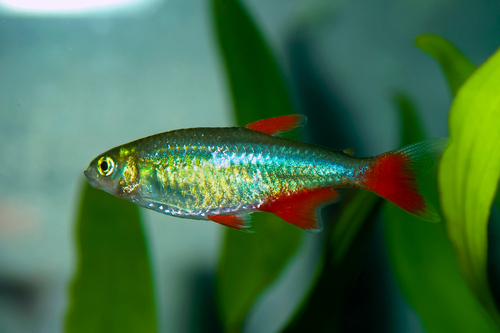
- Scientific Name: Aphyocharax anisitsi
- Mature Size: around 1.5 to 2 inches
- Compatible with: peaceful fish
- Water Temperature: from 70 to 80°F
- Minimum tank size: 30 gallons
- Care Level: Beginner
Bloodfin tetras prefer the chilly freshwater tank conditions as white cloud mountain minnows do. Therefore, I don’t advise keeping them alongside discus fish if you’re a beginner aquarist.
Additionally, during feeding times, bloodfin tetras are rarely hostile and are busy swimmers who buzz in groups. Apart from that, they are calm fish that swim in the tank’s upper and middle levels and get along rather well with discus fish.
Pros to Bloodfin Tetras
- Docile
- Small size
Cons to Bloodfin Tetras
- Prefer colder water
Summary
Discus fish are lovely, calm, and gentle fish who enjoy being in a communal tank with other fish who get along. Always choose a sizable community tank with adequate vegetation and hiding places to give your aquarium fish much fun when selecting the finest tank mates for discus fish.
Frequently Asked Questions
Which fish can be kept with Discus?
Cardinal tetras, neons, emperors, rummy nose tetras, clown loaches, and dwarf cichlids like rams and apistogramma species make aquarium companions. These fish can withstand Discus’s high temperatures and low pH/hardness requirements.
Can Discus go in a community tank?
Yes, discus fish do well in a tank with other freshwater species funded. In an aquarium, calm, schooling fish, notably, members of the characin fish family, provide excellent companions for discus fish. This makes it simpler to create a habitat and environment suitable for both species and conducive to their health.

Ian Sterling, founder of Fishlab.com, began his aquarium journey over 30 years ago, driven by a deep fascination for fish and their diverse personalities. His website, Fishlab.com, is dedicated to making fishkeeping accessible and enjoyable, offering beginner-friendly guidance, expert insights, and a community for aquarists to connect and share experiences.


